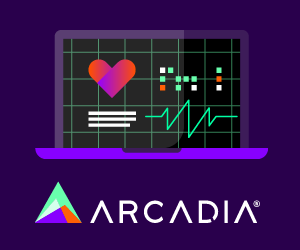
The healthcare industry is experiencing immense pressure from two parallel forces: digital transformation and payment reform. A new phase of big transformation is fueled by evolving consumer expectations around digital experiences accelerated through the pandemic paired with stated objectives from CMS1 to further drive value-based care adoption.
Now, more than ever, data is the currency that will enable healthcare organizations to deliver high-quality care efficiently and in a manner that results in market leading financial outcomes. Future leaders in care delivery and outcomes will be those who prioritize technology innovation. Doing so requires a strategy to empower teams to be more data and informatics enabled, the right data platform to connect data sources and increase information availability across the organization, and a thoughtful roadmap for deploying AI to elevate the productivity of the workforce. Unsurprisingly, this boils down to the age-old adage of people, process, and technology.
Arcadia partnered with HIMSS Market Insights to survey leaders at top healthcare organizations to understand the current state of data utilization within hospitals and health systems and to identify challenges and opportunities within the growing healthcare data and analytics platform market. I encourage you to read the full report to understand how leaders like yourself plan to unlock big data to achieve transformative outcomes for their patients, their teams, and their economics in the coming months and years.
Key findings from the report include:
- A growing demand for healthcare data: 93% of respondents agree access to quality data across all platforms/workflows is critical to an organization’s performance, however only 57% of their organization’s data on average is being used to make intelligent business decisions.2 Modern data platforms are designed to increase data liquidity within an organization, increasing the efficiency in self-service analytics and accelerating insight delivery through interoperability/API layers.
- Clear plans to implement data-oriented tools: A quarter of healthcare leaders plan to integrate population health management tools within the next 12 months, 34% plan to combine data from various sites of care throughout the patient care journey within 24 months, and 38% of leaders plan to implement value-based care payment models within the next two years or so.2 This is especially relevant as there are immense data and analytics needs to support CMS’ objectives to enroll all Medicare patients into accountable care agreements by 2030.
- Views vary on artificial intelligence (AI): Nearly 30% of healthcare leaders said they’ve already implemented AI, with roughly 60% planning to implement such technology in the next 12-24 months or more.2 A small percentage (13%) don’t plan to implement AI at all.2 C-suite leaders are more likely to have plans to implement AI within the next 12 months (30%) compared to those in other leadership positions (7%).2
- Investment challenges with data and analytics: The most significant barrier to implementation is appropriate resourcing. 70% say competing priorities is a challenge to invest in or upgrade an analytics platform.2 58% say staffing to implement and train for new technologies is a barrier their organization faces to modernize.2 Sometimes it’s an issue of money: 47% don’t have the budget.2 Bottom line: healthcare leaders see the transformative value of analytics technology, however, balancing this value with the reality of labor market pressures and competing priorities can make it challenging to move the needle in any one direction.

While this survey focused on resources to implement data platforms, there’s another challenge the industry must overcome: supporting the complex process required to effectively utilize data platforms. A data platform alone is not enough. Success in this data revolution requires a solid strategy and strong leadership. Top-down change management and buy-in from frontline and back-office teams are prerequisites to unlock transformative ROI from investments in analytics. The right data platform partner will be an accelerant to transformation.
Data enabled organizations will emerge as the leaders in the rapidly changing healthcare landscape. These organizations will be better prepared to thrive despite of cost pressures, technological innovation, and new forms of competition. The winners will be those who utilize informatics to drive transformation at scale, and with pace.
To view additional insights and deeper analysis, download The Current State of Healthcare Analytics Platforms.
2 HIMSS and Arcadia Market Insights Pulse Survey Research, Data Analytics Platforms, 2023












